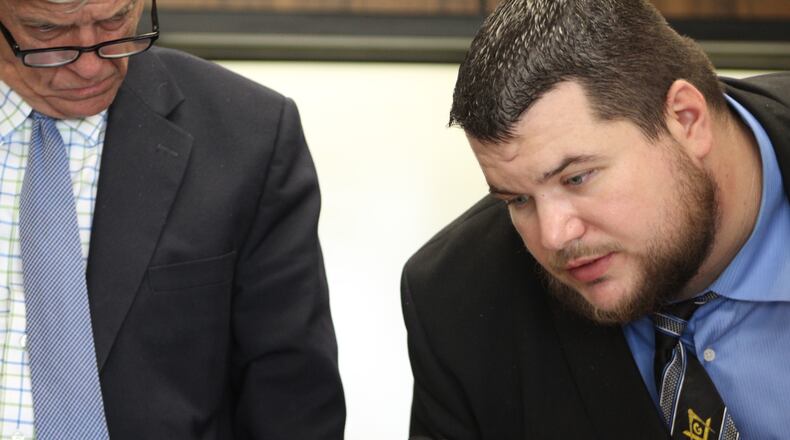Shaver testified Tuesday that his former supervisor, William Landis, allegedly kept cash from selling surplus scrap metal that belonged to the city to pay for work-related items such as a new microwave, refrigerator and employee events. Shaver said at the hearing that he believed the activity was sanctioned by supervisors.
RELATED: Two city employees out after scrap-metal sales probe
Romona Carver, the city’s former division manager of facilities management, testified that she became aware that the city’s plumbing shop had a cash fund in the early to mid-2000s.
“I knew that somewhere there was an envelope with money in it, because people would say — the electricians and plumbers would say — ‘We have funds, and we can use those,’” she said.
Shaver is contesting his firing by the city last year after being accused of inappropriately selling scrap metal, “abusing sick leave” for taking metal to a scrap yard while off work and using the city’s account for an equipment rental that meant he did not have to pay taxes.
RELATED: Contractor says Dayton used scrap-metal money for barbecues, equipment
Landis resigned after facing criminal charges for selling scrap metal for cash following a police investigation last year. The investigation arose out of an incident from October in which Landis allegedly sold nearly 500 pounds of metal at a scrapyard for cash. Shaver was present at the time of the exchange, according to police records.
Dayton employees are required by city policy and state law to deposit the proceeds of all scrap metal sales into the city’s accounts, and Shaver should not have been at the recycling center because it is not his job, said Brent McKenzie, deputy director of Dayton’s department of human resources.
Shaver inappropriately participated in the recycling and was aware that Landis did not pay the money into the city, McKenzie said.
“From the city’s perspective, it was akin to the getaway driver in the bank robbery saying, ‘Look, I didn’t get the money,’” McKenzie testified. “OK, well you are still part of the criminal enterprise.”
Shaver and his attorney have maintained that he did not receive any of the money and believed that his supervisor’s actions were OK and accepted city procedures.
RELATED: Dayton worker indicted on theft in office charges
About three weeks ago, former city of Dayton contractor Russell Dennis testified as a witness for Shaver that Dennis attended employee barbecues allegedly paid for with cash from recycling materials.
A couple of city employees and supervisors have denied this claim, saying they paid for parties with their own cash.
The city terminated its contract with the contracting firm Dennis worked for because of issues with billing errors, city officials said.
Carver, who retired as Dayton’s division manager of facilities management in April 2016, testified that though she never saw the small cash funds, she learned about them from comments made by other employees when she moved over to central services in the 2000s.
POPULAR TODAY:
Carver said she did not and would not have used a cash fund. But, she said, she did not make an effort to find out more details about them because they did not raise a red flag in her mind.
“Supposedly there was a fund there – I never asked a lot of questions, it happened before my time,” she said, later adding, “I just didn’t do it, I stayed away from it. It’s my fault – I didn’t chase it down, I didn’t want to know, I didn’t give the authorization.”
Carver said she believed city employees had to get checks when they sold scrap metal under city policy and did not realize there could be issues.
Carver also testified that Landis told her that he was going to buy a tool with cash from selling scrap metal a couple of weeks before she retired. She said she urged him not to do it, but did not attempt to pursue possible discipline since she was leaving soon.
Pete Hager, director of Central Services with the city, testified that keeping cash to pay for social events would wantonly disregard Dayton’s policies, and there is no credible evidence that workers took part in this unsanctioned activity.
The city permits petty cash funds, but the money has to be recorded with the receipts and other paperwork, and the funds are audited, Hager said.
City departments have specific procedures to request the money they need to pay for tools, equipment and small acquisitions for their departments, Hager said.
Hager said Shaver was fired because he displayed poor judgment on multiple occasions and acted unacceptably careless.
MORE: Shaken-baby victim dies 6 years later; father could face murder charge
Shaver testified that Landis kept a small cash fund seemingly to avoid the paperwork involved in the purchasing process.
Landis retired after facing criminal charges for selling scrap metal for cash after a police investigation last year, according to city of Dayton record. The investigation arose out of an incident from October in which Landis allegedly sold about 470 pounds of metal at a scrapyard for cash, the records show. Shaver does not dispute that he was present at the time of the exchange.
Landis was placed in a diversion program that allowed him to avoid criminal prosecution for theft in office, according to the Montgomery County Prosecutor’s office.
Shaver’s dismissal hearing is expected to continue Monday.
About the Author

